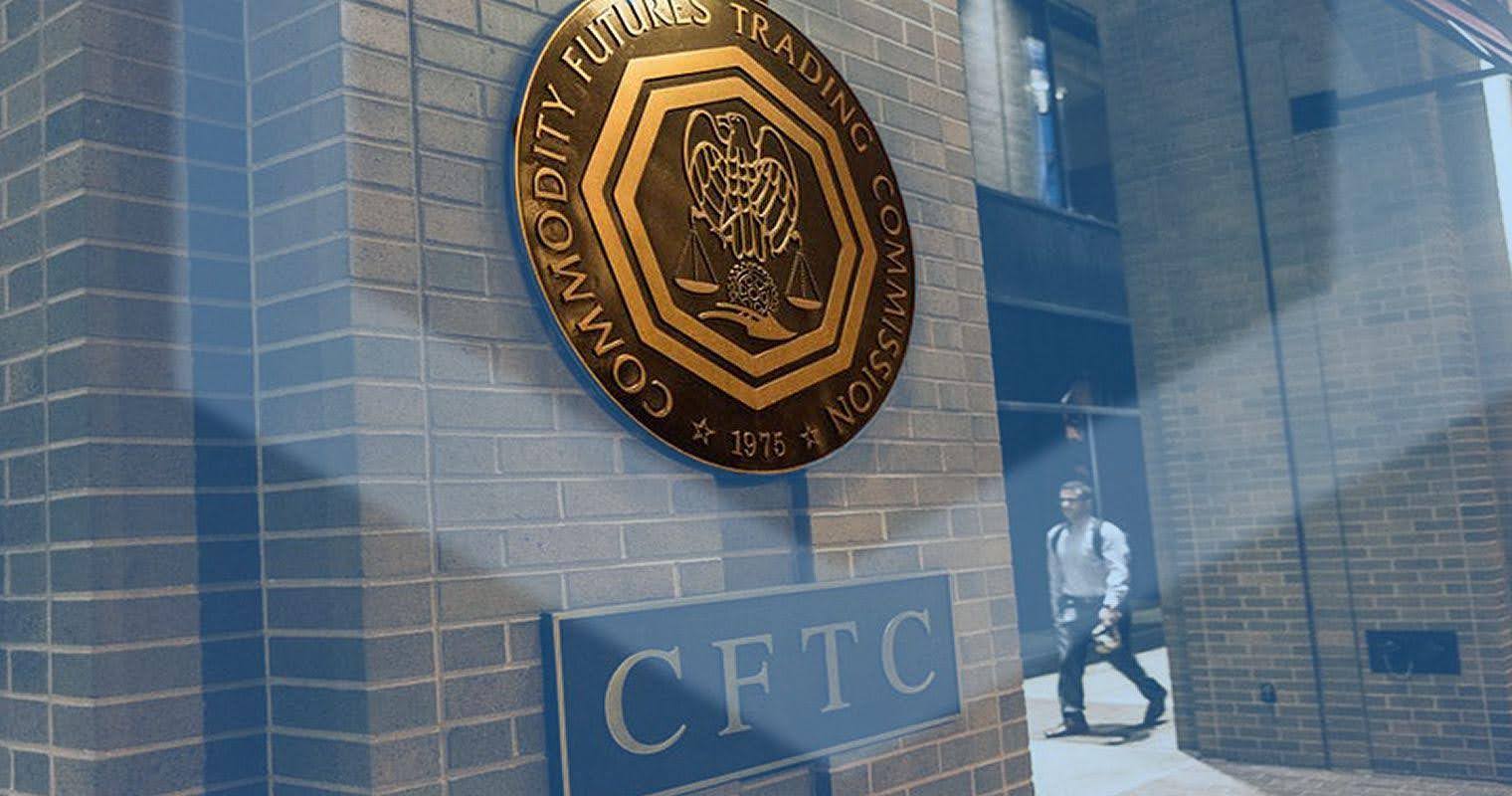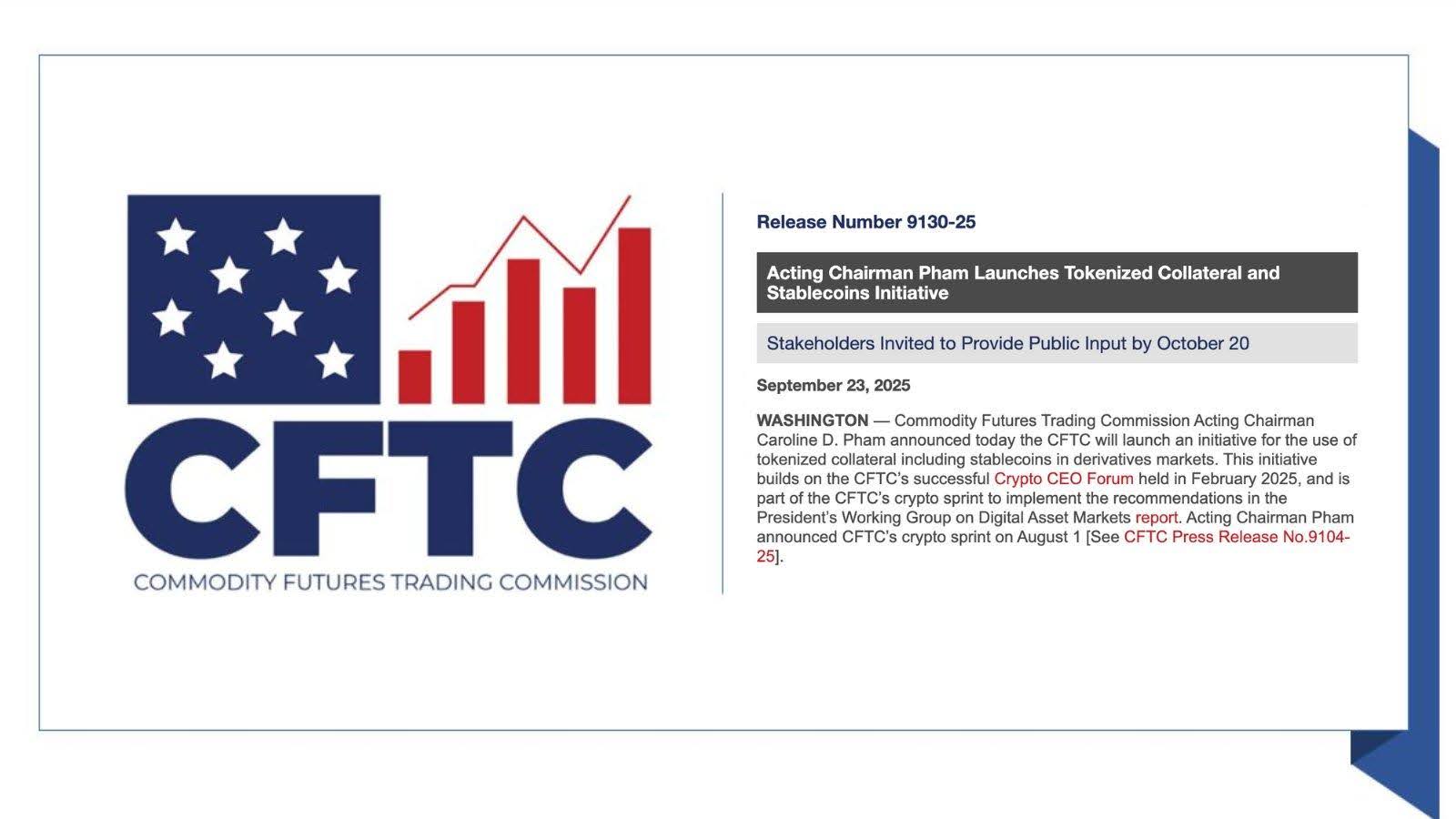CFTC Approves $300B Stablecoin Market for Tokenized Collateral in U.S. Derivatives

Key Takeaways:
- CFTC launches a landmark initiative allowing stablecoins as tokenized collateral in U.S. derivatives markets.
- Public input is open until October 20, shaping rules that could unlock liquidity and efficiency.
- Industry leaders including Circle, Coinbase, Ripple, and Tether back the move, calling it a pivotal step in America’s crypto future.
The U.S. Commodity Futures Trading Commission (CFTC), under Acting Chairman Caroline D. Pham, has unveiled an initiative to integrate tokenized collateral, particularly stablecoins into the nation’s derivatives markets. The move signals the strongest push yet by a U.S. regulator to align traditional finance with digital assets.
Read More: CFTC Opens Path for Global Crypto Exchanges to Serve U.S. Traders Again

CFTC’s Crypto Sprint Accelerates
The announcement comes as part of what Pham calls the agency’s “crypto sprint,” a series of fast-moving regulatory efforts following the President’s Working Group on Digital Asset Markets recommendations. Since taking the helm in early 2025, Pham has made digital assets central to her agenda, emphasizing modernization of collateral management and boosting capital efficiency in financial markets.
“For years I’ve said collateral management is the killer app for stablecoins,” Pham declared. “Tokenized markets are not just coming, they’re here. This initiative ensures the U.S. leads in shaping them responsibly.”
The plan was built on the CFTC’s Crypto CEO Forum earlier this year, where global executives from exchanges and blockchain companies urged regulators to recognize stablecoins as part of mainstream market infrastructure.

Industry Rallies Behind Stablecoin Push
Circle, Coinbase, Ripple, and Tether Voice Support
Key crypto industry leaders immediately praised the CFTC’s move. Circle President Heath Tarbert highlighted that trusted stablecoins such as USDC could be used around the clock to reduce risk and lower collateral costs across markets.
Coinbase’s Greg Tusar described the initiative as “a revolution for U.S. derivatives,” underscoring how regulated stablecoins can transform settlement processes and keep the nation competitive with jurisdictions already advancing tokenized markets.
Ripple’s Jack McDonald emphasized that clear rules on custody, valuation, and reserves will finally give institutions the confidence to scale their use of stablecoins. Tether CEO Paolo Ardoino noted that with stablecoins already forming a $300 billion global market, their recognition in U.S. derivatives represents a defining milestone in global finance.
The GENIUS Act and Regulatory Backdrop
The initiative arrives just weeks after the passage of the Guiding and Establishing National Innovation for U.S. Stablecoins Act (GENIUS Act), which provides a federal framework for stablecoin issuers licensed in the U.S. The law opens the door for these tokens to serve as fully recognized collateral instruments across financial markets.
By embedding stablecoins within derivatives infrastructure, regulators hope to unlock liquidity on a scale previously reserved for cash collateral. Market participants could put idle capital to work more efficiently, potentially driving growth across both crypto and traditional markets.
Global Markets Advisory Committee’s Role
The Global Markets Advisory Committee (GMAC) of the CFTC is a long-standing advocate of non-cash collateral in derivatives. The Digital Asset Markets Subcommittee of last year proposed to harness distributed ledger technology to expand the types of collaterals. This was reflected in the President Working Group where CFTC was urged to give specific advice on how tokenized non-cash collateral can be adopted.
Through the current announcement, Pham has successfully put these recommendations into operation, asking financial institutions stakeholders to crypto-firm stakeholders to offer their view on implementation.
Read More: SEC and CFTC Greenlight Spot Crypto Trading on Registered Exchange
Call for Public Participation
The CFTC currently seeks the opinion of the general and market stakeholders within 30 days, i.e. by October 20. The feedback may be posted through the official web page of the agency, and all the feedback will be published publicly.
In the future, amendments to the CFTC regulations are expected to take the form of feedback, including pilot programs to test the use of tokenized collateral in the real world. This is not an old trick because the agency has a track record of pilot programs dating back to the 1990s and this approach is not foreign to the regulators or the players in the market.
The crypto trading market has already become centralized on stablecoins, which offer a dollar-pegged unit that drives the world of decentralized finance (DeFi) and worldwide exchanges. They can bring those advantages to markets that have been traditionally subject to the regulation of derivatives: they can make settlement timesaving, reduce expenses and create more liquid markets.
The post CFTC Approves $300B Stablecoin Market for Tokenized Collateral in U.S. Derivatives appeared first on CryptoNinjas.
